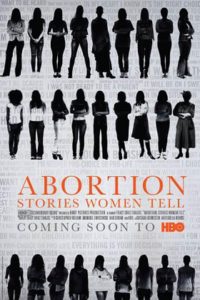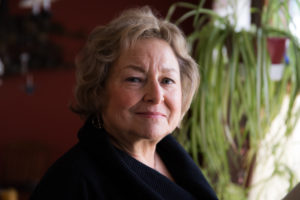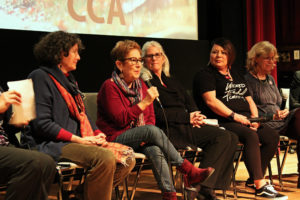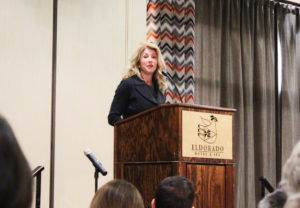Tags
Related Posts
Share This
After Abortion Stories Women Tell

“Abortion Stories Women Tell” will premier on HBO in the spring.
Suzan Sattell, the vice president of the National Organization for Women, passed the microphone to a woman in the very back, shadowed corner of the Center for Contemporary Arts’ theater. The woman described being 19 years old in 1966, and a college student in Missouri. The film that had just ended, Abortion Stories Women Tell, focused on personal accounts of women seeking, protesting and providing abortion services in a state with more abortion access regulation than anywhere else in the country: Missouri.
“I went through an unbelievable situation getting an abortion,” the woman said. In a state with so many obstacles for safe abortion care, even after 44 years of legal abortion, it is hard to imagine a time before Roe V. Wade for Missouri women. The woman in the audience painted a picture for those who weren’t alive during such a dangerous period. “A friend of mine’s husband took me to an Italian restaurant parking lot to meet two guys in a big, blue car who took me away to have this abortion,” she said. “I had a ‘packing,’ which was the very thing I was not supposed to do, but I was desperate so I did it. [Packing] is where the cervix is forced open and is packed with mounds and mounds of gauze with a string. Twenty-four hours later you do a bunch of stuff, drink castor oil, and then you pull the string. Nobody told me what would happened when [I pulled the string].”

Suzan Sattell is the vice president of the Santa Fe chapter of the National Organization for Women. Photo by Jason Stilgebouer.
During the showing of the film, sniffles emitted from the audience. Every so often, unable to contain themselves, angry comments would be whispered at the moments in the film about Forty Days for Life, or when particularly aggressive statements were shouted at the women trying to navigate from their cars into the clinics. Sometimes there were chuckles or outright laughter as the providers on-screen reminded the audience that they are not going to be taken down so easily.
Sattell spoke to Jackalope Magazine about the movement to de-stigmatize abortion. “Planned Parenthood created a safe place for women to [tell their stories]. Some women have never spoken to anybody before [about their abortion].” Sattell specifies older women from a time when abortion was illegal. More than one woman in the audience spoke up about their illegal and dangerous procedures. One woman described flying to Mexico for her abortion, proving that such stories are not just hearsay, but can be kept by one’s friend, family member, or neighbor.

Janet Williams, Janet Gotkin, Dana Middleton, Julianna Koob, Vivianne Clark, and Tanya Romero speak after the film. Photo by Amaya Hoke.
Tanya Romero, the director at Esperanza Shelter for Battered Families, told the audience her own abortion story after being raised Catholic. “At the time, I felt I was betraying all that believed in. I remember that feeling of uncertainty. At the same time, after I had [the procedure], I knew it was the right choice…a path to my own healing from the trauma of my sexual assault.”
Another speaker at the viewing, Julianna Koob, spoke from a different perspective. “I was part of the shaming and the judging,” Koob said. “I grew up in a family where my dad would take us to protests against Roe. He showed us false films about fetuses being torn apart in the womb. I grew up identifying as Pro-Life.” Koon went on to describe how her beliefs changed after working at a domestic violence shelter. “I [then] understood what it meant for women to have autonomy over their bodies.”

Wendy Davis is a former Texas Governor. Photo by Amaya Hoke.
The film was a beautiful way to end a day that began by raising over $123,000 for Planned Parenthood at the Breakfast of Champions through ticket sales and text donations. Wendy Davis, the former Texas state senator and speaker at the event said, “Demoralization can tend to overtake us. It can sink into a degree that keeps us quiet and feeling defeated. But we’ve shown that we have the courage to rise up against what we know to be wrong.”
The women in the film and in the audience proved Davis right. They each decided it was time to speak up and will continue to speak up until abortion is as normalized as any other surgical procedure.
The film Abortion Stories Women Tell will premiere on HBO in March.






 Jackalope Magazine is the student magazine of Santa Fe University of Art and Design. Building on the interdisciplinary nature of our education, we aim to showcase the talent of our university and character of our city.
Jackalope Magazine is the student magazine of Santa Fe University of Art and Design. Building on the interdisciplinary nature of our education, we aim to showcase the talent of our university and character of our city.
Recent Comments